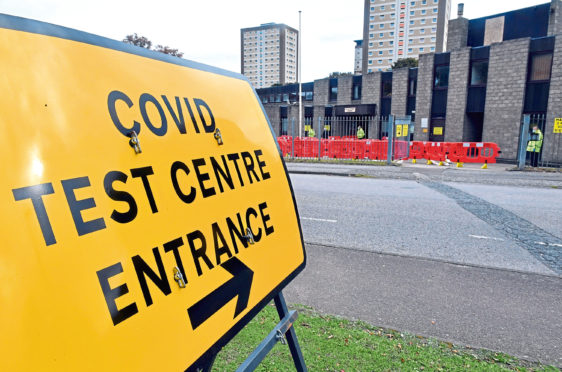The Scottish Government is considering putting Aberdeenshire under tougher coronavirus restrictions following a “substantial” surge in cases in the region.
Deputy First Minister John Swinney yesterday confirmed that infection levels in the area were rising and that the authority area could be moved from level two to three at the next review stage.
Under the more stringent measures, the second strictest in Scotland, all hospitality settings are required to close at 6pm and alcohol sales are banned indoors and outdoors.
There is also a ban on non-essential travel into or out of the level three area, unless it is essential for work, education, shopping, health, outdoor exercise, weddings or funerals.
Mr Swinney said: “There are a number of local authorities around the country that have been contacted because we are seeing, in some circumstances, quite significant increases in the prevalence of the virus.
“For example, there’s quite a substantial rise in Aberdeenshire, which is a level two authority.”
He said the government was “looking very closely” at the region, as he also revealed that parts of the central belt could be plunged into the harsher level four.
It came as the seafood sector expressed hopes that a “worrying rise” in Covid-19 cases in Peterhead and Fraserburgh could be “nipped in the bud” before Christmas.
Ryan Scatterty, managing director of Thistle Seafoods, based in Boddam, near Peterhead, was speaking after it emerged Buchan has become a hotspot for the virus. Seafood processors are at the heart of it and a multi-agency incident management team (IMT) has been set up to help firms minimise the risk on their premises, while supporting their ability to trade.
Public health officials told members of the North East Scotland Fisheries Development Partnership yesterday people employed in the processing sector were not necessarily catching the virus at work – but they were becoming infected in growing numbers.
Shared accommodation and car pooling were highlighted as possible factors during the online meeting.
Mr Scatterty said his factory was paid a visit by an IMT inspector on Thursday, adding: “I’m glad to say we were given a clean bill of health.
“Part of the problem is the recommendations keep updating in a fast-changing environment. Our factory gets a heavy cleaning every night but people are clearly not picking up the virus at work – it’s happening in the community.”
Caling for industry to have a bigger role in the IMT, he said: “We employ in excess of 550 people so it would be no surprise if we did have the odd incident now and again. I would just ask that we are part of the conversation and not just at the receiving end.
“Firms are up against unprecedented financial pressure. Is there something sector-specific which would help us to nip this in the bud before Christmas?”
Dr Corri Black, honorary consultant in public health medicine for NHS Grampian, said case numbers in Aberdeen city were “overall rather flat” but Aberdeenshire had recorded a “worrying and sharp rise in the last week or so”, concentrated in particular in the north-east corner of the county.
Workplaces had been identified as a “key setting”, with a “growing case load”, but these were not necessarily where the virus was being spread, she said.
Failure to tackle the increase now could have knock-on effects for the wider region and its schools, care homes and hospitality businesses, Dr Black said. Chris Littlejohn, deputy director of public health for NHS Grampian, said the purpose of the IMT was not enforcement, although action could be taken against firms not following the rules, but rather helping businesses and their employees to better understand and mitigate the risks.
There were sometimes language and cultural barriers within the workforce to overcome, while care also had to be taken not to stigmatise people, he said.
Banffshire and Buchan Coast SNP MSP Stewart Stevenson said: “For many people there could be a pressure to go into work despite showing symptoms due to financial pressures.
“This is why I would encourage anyone for whom this may be the case to apply for the self-isolation grant from the Scottish Government of up to £500.”
It also emerged yesterday the NHS board Health Protection Team contacted children at Peterhead Academy and Crimond School near Fraserburgh to say one case of the virus had been detected at each school. These latest confirmed cases follow two at Lochpots Primary School, Fraserburgh, earlier this week and three at Ellon Academy confirmed at the weekend.
Scotland yesterday recorded 56 virus deaths and 1,357 positive cases in the prior 24 hours. The death toll under this measure – of people who first tested positive for the virus within the previous 28 days – is now 3,244.
